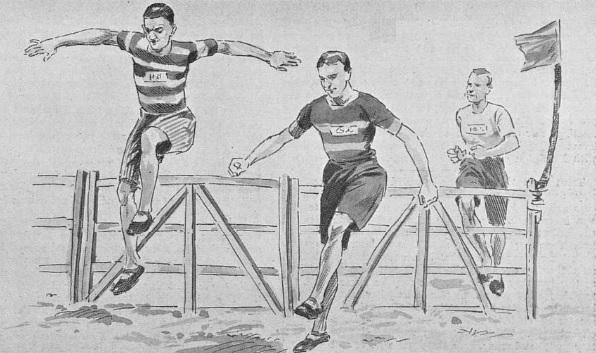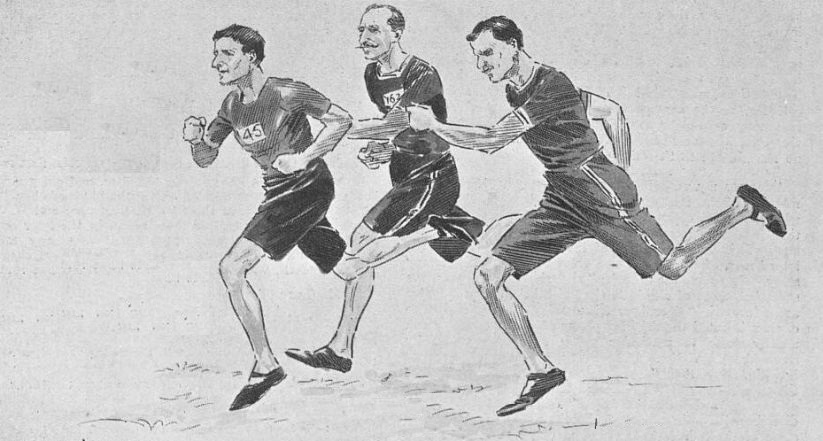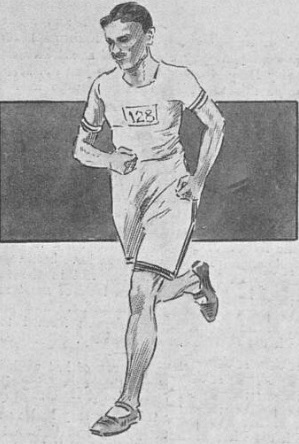Haydock Park Racecourse, Haydock on Saturday 07/03/1903 (Senior Men)

THE NATIONAL CROSS-COUNTRY CHAMPIONSHIP
ALFRED SHRUBB RUNS A GREAT RACE
BIRCHFIELD HARRIERS WIN FIRST HONOURS
A SUCCESSFUL GATHREING
The unmistakable sign of satisfaction that dwelt on the features of the officials responsible for the engineering of the national fixture on Saturday, was a sure indication that the gathering had been a success, and it was with a certain emphasis cheery and encouraging that the hon. sec. Mr. J. H. Hardwick announced the long suffering press division that the receipts amounted to £114. To the average mind probably that announcement conveys nothing; indeed it may come as a surprise, inasmuch a gathering for a National Championship should naturally mean more, they who are in the midst of things know that it suggests an amount of success that means prosperity for at least a year, and such a result is not infrequently missing. And for that result the fullest credit should be given the people who worked it.

Over the hurdles
Few fixtures have been better done. Nothing of importance appeared to be left out of the reckoning. and one of the breeziest annuals we have seen culminated in a handsome turnover which it may be hoped will be of much use to the maintenance of the high quality of work that the Union has been able to provide the public. When Saturday morning broke over the North the same unpropitious weather was in evidence. The rain began to fall early, and they who had an interest in the prosperity of things were filled with doubt as whether it would last the day or take a rest. It continued right up to the hour announced for the commencement, and therefore must have kept many intending visitors away. A stiff breeze came along, however, as the runners felt pretty severely in the open afterwards, and that was the signal for the clouds to lift a little. The sun got through, and at 3.30 all doubt about a fine afternoon had departed. The trains were not especially heavy, bat there was gay spirit aboard which enlivened the atmosphere. Haydock Park began to assume a springtime appearance. Among the crowd could be observed many of the old faces that are rarely absent from such functions. The Northern Counties' A.A.A. provided their special contingent, the Manchester Athletic Club were in evidence, the old-time Booth Hall Plate officials were hand, the veteran handicapper Platt was there, the holder of the world's record for distance running, Harry Watkins, was among the veterans, and E. W. Parry, thrice champion, added his healthy figure to the group, and John Lockwood was here and there usual. These and many others gave their patronage to the event, so that so far as the attendance went it was not only modern, but something historic.
During the morning a few of the officials had been over the course looking to the shape of things, and good judges pronounced the arrangements complete. Of the ten miles or thereabouts two or the equivalent consisted of ploughed land, and other portions were dexterously made up of the steeple-chase order. In the diction of the official programme the start was to be made at the bend of the racecourse, about 400 yards below the stands. This distance and five circuits to be covered, the first four laps including a plough outside the racecourse, and the last lap on the course. Considering the amount rain that had fallen, the surface was not so soft as was expected, and consequently the going turned out to be a trifle easier than was predicted by the average prophet. ln the ballot for places fortune favoured the South London Harriers, and as a consequence the holder of the title was first away, and able free himself from the pressure of the field as they tried for the narrow gap formed opposite the stand. The race will be found fully described below, but the chief aspect was the wonderful running of Shrubb, who from the first drew away, and having more speed and apparently greater stamina, held the whip hand throughout. Time after time Hosker made endeavour to go up to him, but the effort was fruitless. Shrubb had more in him when pushed, moving along as if nothing was troubling him. It was noticed that about the half distance the prominent members of the bunch behind him had given up the idea of getting on terms. Hosker made a struggle through the plough, which must have taken a deal out of him, and Robinson was content to lag behind in the fourth and fifth place. When the bell sounded the last circuit, which was free from plough, the others who had been put stiffly through it thought their chance had come, but they were left to fight it out amongst themselves, as the South London Hamer strode along with undiminished vigour to the straight. He was here holding a lead of something like quarter of a mile, and came along undistressed. Arriving where the crowd were, he was greeted with a fine burst of enthusiasm, and, in return for this recognition, he spurted for about 100 yards, and covered the distance with the watch indicating splendid time when all things are considered.

Race for second place (S. J. Robinson, W. A. Mercer and J. Hosker)
As will be seen from the table, Sid Robinson was second, having sprinted past Mercer, who was but three yards in front of Hosker, of whom better things were expected. Still, taking the times of the three, it will be noted that they were close up to each other, only a matter of four seconds covering them. Credit should be given T. Edwards, of the Manchester Harriers, for his forward running, and Lawson, of Leeds, certainly justified his subsequent selection to represent the country against the Hibernians, Glasgow, on the 28th inst. A glance through the table annexed will give the details of the quality given the remainder of those who managed to get into the first fifty. But what is to be said of the performance of the clubs in the aggregate? In Saturday's issue of the Sporting Life it was stated that Birchfield would probably gain club honours, and this they managed readily enough. So also was the forward running of the Salford Harriers hinted at; but few people fancied the holders would be beaten out into fourth place by Farnworth. The running of the Highgate Harriers is too indifferent to be true, and daresay they are unable to account for it, and Crewe are probably astonished at finding themselves placed fifth a fortnight after their success in the Northern Championship over the same course. Such is the fortune of war. They were all gallant triers, and it is to be hoped they will show an improvement when we next see them. The total number going the post was 140, the Cheshire Tally Ho standing out.
THE RACE
The draw for positions resulted: 1, South London; 2. Sankey; 3, Birchfield; 4, Sefton; 5. Sutton; 6. Manchester; 7, Essex Beagles; 8, Crewe: 9. Salford: 10, Small Heath: 11, Warrington; 12, Highgate; 13, Farnworth; 14, Leeds A.C. They were sent away to a capital start, the weather being bright and the group forming a brilliant spectacle. The first to stride out was Barker, who was followed by Straw about four yards to the rear. Then came Hosker of Widnes, and Edwards (Manchester), Shrubb being closed in with the others negotiating the narrow gap a furlong from the start. Ashton was lying close up, and in this order they went into the country for the first circuit. When they came into view again it was observed that Shrubb held an advantage of something like twenty yards, and his nearest attendant was Sid Robinson, who in turn was four yards in front of Edwards, with Mercer, Barker, Coughlin, Hosker, and Straw in a bunch extending twenty five yards. The remainder showed signs of tailing off in the usual manner. When they next passed the starting-point Shrubb was out by himself eighty yards, his nearest neighbour being Mercer, with Edwards and Hosker lying fifteen yards away. Following them came Lawson, Barker, Coughlin, Webber, Straw, Pratt, and Thomas, and Highgate on figures hold a distinct advantage.

Alfred Shrubb
Over in the country it was noticeable that Hosker was doing good work among the plough, but when they came within sight Shrubb had further increased his lead to 200 yards, and gave the impression that he had nothing to fear. He was moving very evenly, and gave no sign of decreasing his speed. Mercer, Hosker, Robinson, and Edwards formed a group in which a couple of yards would cover them, and a hundred yards further came Lawson, who in turn was eighty yards in front of Barker, with Coughlin, Thomas, Whiston, and Webber next on view. There was now a very extended tail, and the issue for both for club and individual appeared settled. The next time round when the eighth mile was negotiated the South London Harrier had such command of his field that the possibility of any other menacing his position was nil. He was 300 yards to the good; Edwards lying next, a hundred yards better than Hosker and Mercer, who were level. Twenty yards to the rear Robinson was running apparently fresh enough, and 150 yards behind him came Lawson, who was a considerable distance in front of the remainder. As the leader went into the last lap he was given a ringing cheer, and in response he drew further away. The rest may told briefly, Shrubb coming along alone quickly made it a one-horse race. Without bearing the slightest sign of giving out he maintained his speed despite the fact that there was no necessity to exert himself. Coming into the straight for the finish he sprinted for over a hundred yards 400 yards ahead of his field, with Robinson, who also sprinted, two yards in front of Mercer, who was a similar better than Hosker. The winner was given a splendid ovation as he finished fresh and well. The District-Superintendent Barton, of the Great Central Railway, deserves credit for the excellent management of the traffic.